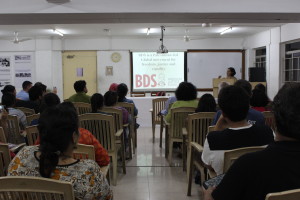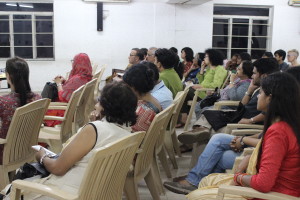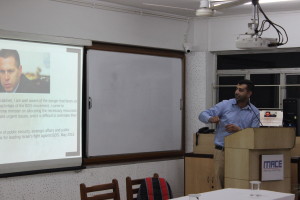Teaching a history that is built on a shared past and on conflict is not easy. In the subcontinent we have been grappling with the issue of bias and misrepresentation of facts in history textbooks from India, Pakistan and Bangladesh. Othering is both blatant and often taught without questioning. Textbooks in Israel and Palestine have the same othering, finger pointing and name-calling. In January, we had Palestinian author and poet Ghassan Zaqtan deliver a talk ‘Where the Bird Disappeared’—based on his literary work. He spoke about how it is impossible, as a Palestinian, to escape politics. It is not an option, not a luxury. He spoke of memory, loss and boundaries. At History for Peace, apart from examining deep-rooted bias and addressing it, we also work with educators, giving them the exposure to as many different voices as possible, so they might take these unheard voices into their classrooms.
The Boycott, Divestment and Sanctions Movement (BDS) is led by Palestinians and was launched by various civil society organisations as a form of non-violent protest and civil agitation. It fights for freedom, justice and equality. On 24 March, Mahmoud Nawaja’a, General Coordinator of the Palestinian National Committee for Boycott, Divestment and Sanctions, spoke to a gathering of fifty odd educators, teacher trainees and members of civil society about the work that they do and how grassroots mobilization and individual commitment can take a movement forward.
Apoorva Gautam, South Asia Coordinator for the BDS Movement began the talk by tracing India’s relations with Palestine: how Gandhi had expressed solidarity with the Palestinian cause and how, decades later, the conversation has changed, both politically and in terms of economics. Nawaja’a went onto discuss the movement in detail and how it is relevant to India in the current socio-economic context given that India supports Israel through foreign policy and markets.
One of the Movement’s international campaigns is the Boycott HP campaign. HP (Hewlett-Packard) is a major provider of technology at Israeli checkpoints: biometric check in particular. The campaign relies on effective grassroots mobilization. Apart from political and economic boycott, the BDS Movement also relies on Cultural Boycott calling upon international artistes to cancel shows in Israel.
In the discussion that followed, the importance of cultural exchange was brought up. A person-to-person dialogue is something that we at PeaceWorks and History for Peace place great value on and have worked with extensively. While the results are sometimes intangible, it does often lead to changed mindsets, which begin at the individual level and has the potential to affect change on a larger scale. Of course, in cases of extreme conflict it has not been shown to have significant success.
Difficult times call for creative and hard-hitting ways of protest. Walkouts, silent marches, art, spoken word, bearing witness. The talk brought to us a form of peaceful agitation and gave us a way to show solidarity. It also gave the educators a new perspective to take back into their classrooms.
–Paroma Sengupta



